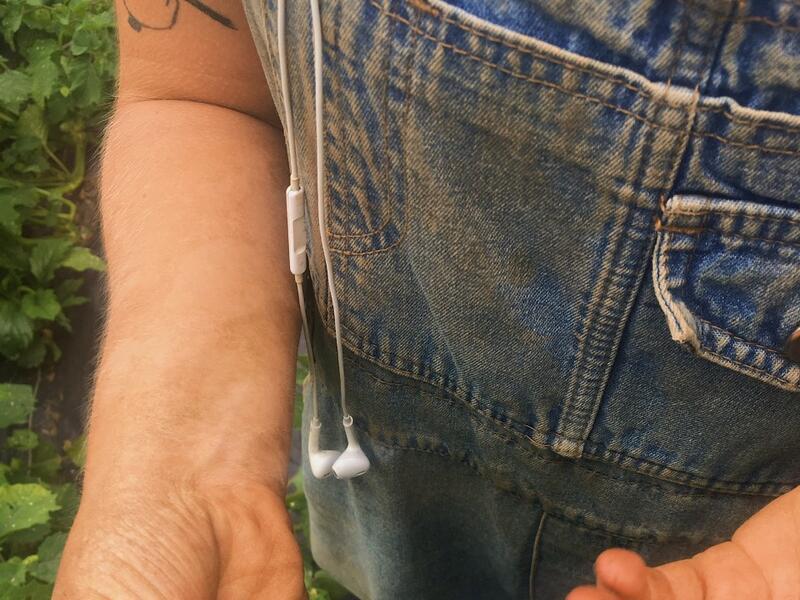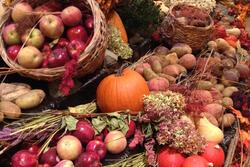This Sukkot, Let’s Commit to Respecting and Caring for Our Land
For many Jews living in the Northern Hemisphere, Sukkot is synonymous with the coming of fall. The association between the changing seasons and Sukkot (and other Jewish holidays) is also religiously accurate. Sukkot, which lasts for seven days, celebrates the harvest following the growing season.
For Jews living in pre-modern and biblical times, the holiday was more than just symbolic. In many cultures, harvest festivals originate in periods when people’s survival often depended on the outcome of a harvest. A poor harvest season might mean a difficult winter, during which people would go hungry. For the Israelites, Sukkot marked the beginning of the rainy season. The amount of rain had implications not only for the future harvest, but for weather like droughts and flooding that might impact survival. That’s why we say a prayer at the end of Sukkot asking for a good rainfall, and a different one on the first morning of Passover asking for field-moistening dew.
In our modern world, it’s very easy to take our food for granted. Those of us who aren’t actively engaged in farming usually see our food only in grocery stores, forgetting the labor that goes into harvesting, processing, and packaging it. Often, the closest we get to our food sources is at farmers’ markets, in home gardens that supplement our main food sources, or at U-pick farms. As a result, the way in which Sukkot is tied to seasonal harvest patterns often gets lost behind a symbolism that is disconnected from how we live our daily lives.
This year, Sukkot is extra special because it marks the beginning of a new shmita cycle. The cycle lasts seven years, and in the seventh year, the Torah mandates a Sabbath for the land: agricultural activity, including plowing, planting, pruning, and harvesting, is supposed to cease. Anything that happens to grow on the land must be made available for free.
The shmita year is a stipulation that is difficult to follow within a capitalist system focused on growth at the expense of rest and recuperation. Over the past year, I’ve spoken with my sister, a farmer, about her struggle to engage with the idea of rest in a world that constantly asks for more, leaving little room for Jewish farmers like her to live out their religious and personal beliefs.
There are some suggestions for how to engage in shmita within our current system. For example, the Jewish Farmer Network suggests setting aside a small piece of land to rest, which allows farmers to continue to produce food, while also respecting parts of the land that need restoration.
One of the biggest threats facing our land (and livelihood) is climate change. Scientists have continually pointed out that our current practices are having disastrous effects on weather patterns (flooding in Pakistan and Puerto Rico, for example, and most recently, Hurricane Ian in Florida) and food production. If we continue down this path, we’ll see increasing food insecurity, not to mention the elimination of the seasonal changes that are so ingrained in our cultural and religious heritage.
Jewish farmers and many Jewish communities see shmita as a way to fight climate change. A growing movement in the United States uses Torah and the idea of shmita to advocate for environmental justice and economic justice, promoting the idea that land shouldn’t be owned or provide individual profit.
In parallel, an indigenous rights movement run by NDN Collective has advocated for LANDBACK in the United States. LANDBACK calls for a literal return of stolen land, culture, and practices to indigenous groups across the Americas. The movement also advocates for the dismantling of white supremacist systems that continue to harm indigenous communities, such as prison systems, police institutions, and capitalism. NDN Collective and other indigenous groups also argue that returning land to indigenous care can help address climate change; for example, traditional controlled burning could help prevent wildfires in California.
Sukkot is a festival holiday. We’re meant to dance and celebrate the harvest, the coming year, and our relationship to the Earth and to each other. I encourage you to revel in this celebration: celebrating our food and our harvest is an act of resistance to institutions that encourage us to take these things for granted.
But I also urge you to think about the connection between the land and the food we eat—beyond the seven-day celebration. Looking at your own actions is one way to start. Where do you get your food from? Is there a more ethical way to source your food? Can you advocate for rest and recuperation in your own life and in the lives of others, even as the shmita year comes to an end?
But individual actions can only take us so far. Advocating for land and climate justice must involve fighting institutionalized structures that are ingrained in our modern world. Consider donating to and supporting funds that advocate for land back movements, such as Indigenous Climate Network, Coast Protectors, and Decolonize This Place. Seek out activist groups within or close to your home community. Support policies that fight climate change at an industrial level, such as the Green New Deal. Judaism asks us to uphold practices that respect our land and the people who care for it. As we enter a new shmita cycle, heeding this call to action is more urgent than ever.






